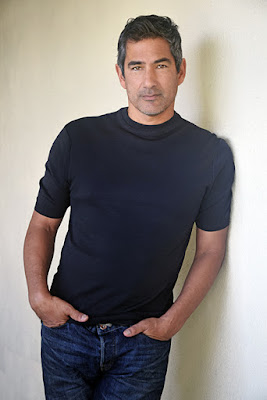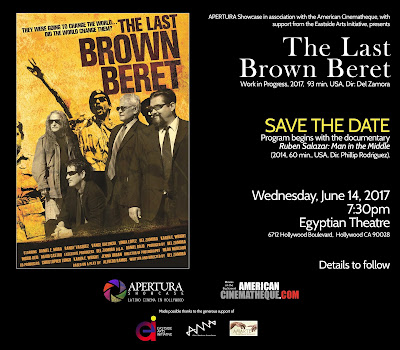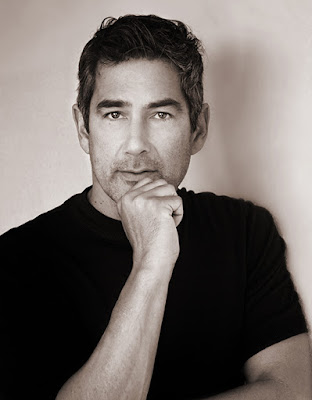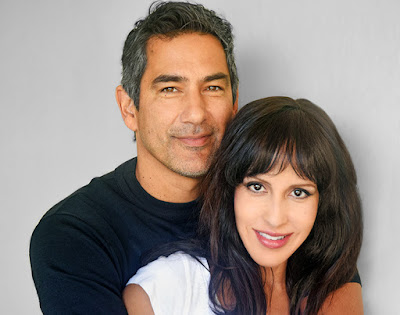All Photos: Alan Mercer
In 2009, with a career spanning nearly four decades, actor Randy Vasquez paused his acting to fulfill a promise to his parents— finish his studies and graduate from U.C.L.A. Mission accomplished. Today, he’s back to acting, recently seen on NCIS: New Orleans, Roadies, Shameless, Bosch and in the Sci Fi movie, Day of Reckoning. Oh, and by the way, he was discovered by famed talent manager, Robert Marcucci, one of the most important managers of all time, whose life was immortalized in the movie, The Idolmaker.
Randy's newest film, 'THE LAST BROWN BERET' screens on June 14, 2017 at the world famous Egyptian Theater, in Hollywood; as part of American Cinematheque's Apertura Showcase Series.
Alan Mercer: What an impressive career you’ve been blessed with both as an actor and filmmaker. Where are you from?
Randy Vasquez: I was born in Escondido down near San Diego. My father came to Escondido via Mexico. My mother is a coal miner's daughter from West Virginia.
AM: You’re Mexican and Anglo?
RV: My parents met in college here in L.A. in the 50’s at Woodbury University and after they married, moved to Escondido. They divorced when I was five and our mom moved my brother and I to North Carolina, where her family was, mainly in High Point but also in the mountains, Appalachia. I wasn’t happy living in North Carolina and eventually I was able to convince my mother to let me stay with my dad in California. I returned to Escondido and finished high school and then got accepted at UCLA. That was my ticket to L.A.
AM: For a kid moving to Appalachia from sunny California, where being Latino is more common and accepting, it must have been challenging for you.
RV: It was. My brother, Perry, identifies as an Appalachicano. That’s one way of putting it!
AM: Did you always want to be an actor?
RV: Yes. Or a baseball player. Or a veterinarian.
AM: You look like a baseball player.
RV: I’m a center fielder and my father was a baseball player so he instilled that in me. I used to watch a lot of TV growing up, Gilligan’s Island, Sanford and Son.
RV: I’m a center fielder and my father was a baseball player so he instilled that in me. I used to watch a lot of TV growing up, Gilligan’s Island, Sanford and Son.
There were two movie theaters in my neighborhood and I would walk to them to see movies all the time, whatever was playing. I realized that’s a kind of fun that I wanted to be a part of and I knew I had to be in L.A. to pursue it.
AM: Didn’t like living in the South?
RV: No. I felt trapped there. I longed for California and getting to L.A. somehow, someday.
AM: And it worked out for you because you are a successful working actor. Were your parents disappointed you pursued acting?
RV: Probably. I came here [Los Angeles] in 1979, and dropped out of UCLA. I didn’t like it. I didn’t want to write ten page term papers so I dropped out and set out on my own without knowing anyone.
AM: Risky and brave.
RV: I got a job at a Westwood ice cream parlor. The owner was an actor from New York and knew I was starting out. He told me to study with a guy named Tony Ponzini. So I contacted him through Dramalogue, the main acting newspaper at the time. Tony introduced me to Robert Marcucci, who was a talent manager who’d made his name in music.
AM: Bob Marcucci, of ‘Idolmaker’ fame? Wow!
RV: Yeah. He discovered Frankie Avalon and Fabian in south Philly in the late ‘50’s during that vacuum created by Elvis when he went in the Army. Bob came to see me one night in Tony’s acting class when I was doing a scene from “Middle of the Night.” During the break he said, ‘Hey kid, do you want to be a star?’ I said yes. Then he said, ‘Let’s get to know each other for a year and then well see what happens after that.’ A year later, he hooked me up with an audition for an agent, who took me on. Then came Highway To Heaven, Beverly Hills Cop, Hill St. Blues and some others. I worked but not steadily so I still had to have extra jobs; waiter, carpenter, ticket scalper.
AM: Sure like other actors.
RV: I forced myself to do a lot of stage work. I had a good foundation with Tony, who was a graduate of the Neighborhood Playhouse and also a member of the Actor’s Studio from that 60’s —so he combined those two acting methods like a lot of teachers did. He preferred Meisner over Strasberg. Any way, we really connected. He was like a father figure who encouraged and pushed me in class.
AM: Then you kind of walked away from acting at some point, didn’t you?
RV: Well the first time I did that, I didn’t really walk away. I left L.A. to move to New York when I was cast in an off-Broadway show at Circle Rep. I ended up staying for a year and a half, studying, doing shows.
RV: Well the first time I did that, I didn’t really walk away. I left L.A. to move to New York when I was cast in an off-Broadway show at Circle Rep. I ended up staying for a year and a half, studying, doing shows.
AM: You’re really a serious type of actor. You’re skilled, studied and trained and all that—you’ve paid your dues, because not all actors are that serious or willing to invest what it takes to succeed.
RV: When I first came out to L.A., I didn’t know anyone here, so I figured that the only way I could make it was to become really good. My father was a high school teacher and an accountant. He was a serious guy, a hard worker and that was a trait I got from him and applied it. I think I disappointed my family when I dropped out of college so I decided to study acting extra hard to make up for that. As much as I hated being on stage, I forced myself to do it.
AM: Really? Why did you hate it?
RV: It wasn’t in my nature to act up in front of people but I realized there was no shortcut to being successful at it so that’s what I did. I did stuff I didn’t really like doing. I’ve never liked inviting people to my plays.
AM: Which you continue to do now, you are frequently cast in stage productions, correct?
RV: I’ve done four plays in the past year and I’m starting on another one as we speak. Small theater. I’ve lost count of all the plays I’ve ever done. It helps with auditions to be in a show. It’s so damn hard to get an acting job, but the process has gotten a lot easier as I’ve gotten older.
AM: You’re now more fearless as an actor?
RV: I wouldn’t call it fearlessness. I don’t get in my own way as much as before. A good director helps, too.
AM: Being an actor is one thing and being a filmmaker is another, how did that shift happen?
RV: In the mid 1990’s I was questioning my life, what else I could do. I’d been an actor for about 15 years and I was burnt out and felt I wasn’t getting anywhere. I was refinishing furniture, an 8 to 4 job. ‘What is it that I’m going to do now. Maybe this acting thing isn’t it?’ I was sick of thinking of myself all the time so I started concerning myself with other people’s struggles. I started to volunteer, reading for kids at school and helping them with their homework. ‘What’s it all about, this life… this world… my life…’ you know I’d been so about me for so long and now it was about what I can do something to help others.
AM: You do what you have to do that’s the side effect of an acting career.
RV: Anyway, how the shift to film making came about. I had this idea to travel to Mexico after the Zapatista revolt in Chiapas Mexico on New Year’s Day of 1994. I wanted to check it out. So I went to Chiapas and was able to acquire some great photos from an AP [Associated Press] photographer in Mexico City. With the help of my friend Paul Freedman, a film editor, I put together my first film—a pictorial essay or a musical documentary that contrasted the original Zapata 1910 movement with the Chiapas revolt in 1994. I used this beautiful symphony by Manuel Ponce, a Mexican composer, called Concert of the South with Andre Segovia on guitar.
AM: Sounds wonderful.
RV: It was a great first film experience. After that I met Maria Guardado a woman from El Salvador, who had escaped the death squads and relocated to the U.S. She was part of the Salvadoran diaspora here in the 80’s. She was a political activist who inspired me. She reminded me of my grandmother. I made a documentary about her, Testimony: The Maria Guardado Story, and it took about four years to complete. It kind of filled a cinematic vacuum of experiences from that country’s civil war. We finished it in 2001. It was very well received in many film festivals including the Havana Film Festival, which I attended.
AM: What a blessing Maria Guardaro met you—
RV: It was a blessing for me too. She became a special friend. I miss her a lot.
AM: You did another documentary after that I hear is also about exposing social injustices.
RV: About the American Indian boarding school experience of Walter Littlemoon from Wounded Knee, South Dakota, which became The Thick Dark Fog, and aired on PBS in 2012. I visited Walter and his wife, Jane, several times over the seven years it took me to make that film. In the middle of it is when I went back to UCLA and got my degree in American Indian Studies. Walter and Maria were similar to me. They had a lot of pride in their ethnic identity, which was an issue for me growing up. They were leaders in their communities. Both films have found a lot of distribution with universities, colleges and community groups throughout the U.S. and abroad. My latest documentary, Badger Creek, is available on PBS. Check your local listings as they say.
AM: I saw it! I’m in awe of this story’s patriarch and matriarch at how early in their marriage they made the life-altering decision that they would raise their future kids free of liquor and drugs.
RV: Badger Creek is a portrait of Native resilience as seen through a year in the life of three generations of a Blackfeet family living on the rez in Montana. The Mombergs are a loving, sober family who run a successful ranch, live a traditional worldview and are re-learning their language—a great family that I wanted to introduce to the American public.
AM: So from the period of 1998 to 2003, just before you started your first documentary, your acting career did click on high gear, didn’t it?
RV: Yes. I was a regular on three series in a row—they redid the Aaron Spelling’s Love Boat with Robert Urich on UPN, when that network first launched. I was on JAGfor five years, then Don Bellisario created a new show about the Supreme Court with Joe Montagna and James Garner called First Monday. I was lucky that Don Bellisario took a liking to me. That all gave me some financial independence, enough to buy a home, and I also a place in the desert to get away.
AM: That was really smart of you. A lot of actors who make money don’t think of investing.
RV: My father was my business manager and told me it was time for me to buy something, and then told me to buy again. Eventually, I sold the desert property before the crash and made money. That put me through UCLA when I went back.
AM: You’ve had some pretty good luck as a working actor – when just about all who are trying to make it, are struggling barely covering their living expenses.
RV: It was luck and my dad’s management. But before I hit this positive time in my acting career, when I was about to give it all up, my agent calls with this audition, ‘They’re doing the Love Boat again, you’re reading for the sexy bartender, a Latin guy.’ My instant reaction was, ‘Oh jeez, probably not going to be good,’ but as always, I went.
AM: That’s what you do.
RV: I went to the audition. Read it and got a callback. I met Aaron Spelling, who liked me. I’d been painting furniture at the time and two weeks later, I’m on the Caribbean filming on this cruise ship, and after that my career took off. They started paying me ridiculous amounts of money each week and that’s how I was able to invest. Crazy.
AM: That good luck again.
RV: It was a combination of good fortune and being represented by William Morris, which wouldn’t have happened without Bob Marcucci. He introduced me to John Kimble there shortly before John retired.
AM: Making so much money all at once is heady, how did it affect you?
RV: I started to ease up on the gas pedal. I wanted to enjoy life more.
AM: It’s a maturing and shifting of one’s priorities.
RV: I was in my 40’s and I wanted to enjoy the fruits of all my labor and that’s what I did. I was able to finish up and pay for Testimony and also finance some of the production part of The Thick Dark Fog. And like I said, I was able to pay for my education at UCLA and avoid all that student loan stuff.
AM: And, now you’re back to acting, a turnaround of sorts—
RV: I hit rock bottom about three years ago emotionally, spiritually. I worked to heal myself creatively. I started from the beginning by going back to acting class with Howard Fine, focusing on the stage again. I did play readings, student films, anything to turn myself around, to pull myself out of my morass. Good parts in plays, TV and indie films came around. I could feel that my work was better, freer, and more effortless. And that’s where I’m at now. I have a couple of films in the can and I’m in a really great relationship.
AM: See, life always turns around.
RV: It does. I’d forgotten how that can happen. It’s not easy being in an industry that rejects you constantly. Last week I had four auditions and four rejections. But I believe in myself more than ever and that sustains me.
AM: I actually feel like you’re going to have another reversal of fortune like you did in 1998.
RV: I have faith in my experience, and that helps with auditions. I’m grateful.
AM: It’s good you are focused on the gratitude of what you do have, did get, will get, will have, or will get.
RV: Yeah, it’s kind of an ongoing battle – but I think it’s just a matter of time. There’s no replacement for experience.
AM: You’re going to work more… You’ve still matinee idol handsome … very striking and that’s not always the case. You do not look your age. I would not have guessed your age. Without the salt and pepper, you can easily pass for 35.
Randy laughs. His girlfriend, actress Marilyn Sanabria, agrees.
RV: I feel great and ready to work… I need to fix this place up, take Marilyn to Paris…(laughs)
AM: Thank you for sharing your life as an actor. All of it the ups and downs and hope this interview can help other young actors prepare for the challenges they will face.





